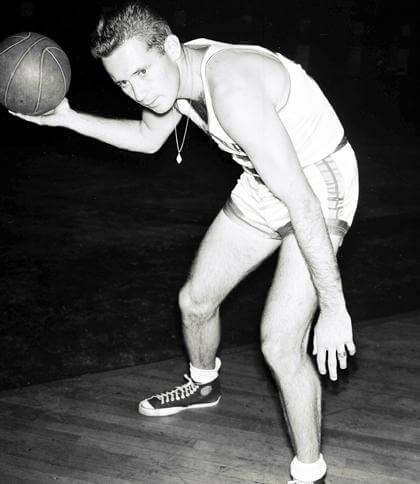By Philip Newman
In a basketball era long before three-point goals and shot clocks, Dick McGuire starred at St. John’s University, then spent more than a half century as a New York Knicks All-Star, then a coach, scout and consultant.
McGuire, 84, who died last week in Huntington, L.I., near his home in Dix Hills, led the Knicks to three consecutive championships from 1951-53 and St. John’s to the National Invitational Tourney in 1944. Born in the Bronx, he moved to the Rockaways as a child.
His No. 15 jersey hangs in Madison Square Garden and he was inducted into the National Basketball Hall of Fame in 1993.
McGuire’s was a period when four rather than five personal fouls meant banishment from the court, when a team could pass the ball around almost endlessly in a stall later made impossible by the shot clock and when all baskets were worth two points.
McGuire’s specialty was razzle-dazzle ball-handling and it sometimes seemed he had an aversion to shooting.
“His ability to penetrate the defense of the opposing team was the result of his remarkable peripheral vision and ability to take advantage of the split second opening, often with a bounce pass, to connect with a teammate cutting for the basket,” said John Griffin of Queens Village, former sports editor of United Press International, the student manager of the Redmen basketball team and a classmate of McGuire’s at St. John’s.
“Dick was a master of misdirection as far as the opposing team was concerned,” Griffin said.
Indeed, the citation of the Naismith Basketball Hall of Fame reads “Dick McGuire played basketball as if he had eyes in the back of his head.”
McGuire’s precision ball-handling was sometimes compared to that of Bob Cousy, another Queens product, who followed McGuire into the NBA and was not only a wizard at ball-handling but a high scorer.
McGuire was among the untold numbers of players, many of whom made it big in college and the NBA, who perfected their craft — once known as the New York Game — on the legendary asphalt courts with mostly netless goals at 108th Street in the Rockaways. McGuire’s parents operated a bar nearby.
Among the highlights of his career were as a player on the National Invitational Tournament championship St. John’s team in 1944, a Helms Foundation All-America team member at St. John’s in 1944, a member of the Dartmouth team in the NCAA Final Four in 1944 and an NBA All-Star with the Knicks in 1951, 1952, 1954-56 and 1958-59.
Griffin said that throughout his career, McGuire seemed reluctant to shoot — a characteristic that sometimes irked late Coach Joe Lapchick of the Knicks.
As a result, McGuire averaged eight points a game.
McGuire’s younger brother, Al, coached the 1977 Marquette University basketball team to the NCAA title, then appeared on television as a basketball commentator. The McGuires were the only brothers to make the Naismith basketball Hall of Fame.
“Whereas Al had the gift of gab and the humorous yarn, Dick was not a talkative fellow,” Griffin said.
“At St. John’s, Dick and I were in a speech class in which the students were required to give a speech,” Griffin said. “I recall wondering how Dick would do considering his taciturn manner — we called him ‘Mumbles’ after a Dick Tracy comic strip villain.”
“As I recall, it was not a long speech and the content was excellent,” Griffin said. “Although it was uncertain whether it met the goal of getting Dick to enunciate.”
“But above all, this was a nice man, a person of high principles on and off the basketball court,” Griffin said.
McGuire is survived byspan class=”Apple-style-span” style=”font-family: Interstate, Helvetica, sans-serif; font-size: 9px; ” his wife, Teri; brother John; sister Catherine Mann; daughter Leslie Dwyer; sons, Richard, Michael and Scott; and seven grandchildren.
Reach contributing writer Philip Newman by e-mail at timesledgernews@cnglocal.com or phone at 718-260-4536.



































